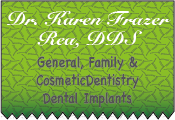Good experience, very friendly and patient staff!
- DeAndra C.
Longview dentist explains periodontics and periodontal disease
Periodontal disease is a serious issue for many patients that can be devastating to the smile. It can cause irreversible damage including loss of teeth, bone, and gum tissue, if not diagnosed and treated early. At Rea Dental, one of our areas of treatment is periodontics. We spend a great deal of time educating our patients on the risks and symptoms of periodontal disease along with the best ways to prevent it from occurring. If you suspect you are in the early stages of periodontal disease, it is important to schedule an appointment to be evaluated. If caught early enough the disease can be reversed, the later stages can only be controlled.
The number one cause of periodontal disease is improper oral hygiene. Patients who do not brush and floss effectively are at a higher risk for the disease. The first stage of periodontal disease is called gingivitis. The disease is caused by a bacterial infection within the mouth. Symptoms may include swelling, redness, and bleeding of the gums. If left untreated, the gum tissue will begin to separate from the teeth; developing pockets where bacteria and plaque can collect and erode tooth enamel. The bone structure will begin to become adversely affected and teeth can loosen and even fall out.
If discovered in the gingivitis stage, treatment for periodontal disease involves a professional deep cleaning to remove bacteria and tartar. In some cases of infection, antibiotics may be necessary. Once the disease has advanced beyond gingivitis, treatment becomes more extensive and can include scaling and root planning, surgery, or even a bone graft. Patients who have lost teeth due to periodontal disease will need to have their bone structure evaluated before placement of dental implants.
The best way to avoid periodontal disease is to brush at least twice each day and floss once per day. It is also imperative that you continue to see us for general check-ups. Visiting the dentist every six months allows your teeth to be professionally cleaned and your mouth to be monitored for early signs of gingivitis. When caught early enough, gingivitis can be reversed and patients can continue to enjoy a lifetime of healthy teeth.
If you feel like you have symptoms of periodontal disease or would like to learn more about prevention, call our office today to schedule a consultation.
Back to Periodontics Home Page
The number one cause of periodontal disease is improper oral hygiene. Patients who do not brush and floss effectively are at a higher risk for the disease. The first stage of periodontal disease is called gingivitis. The disease is caused by a bacterial infection within the mouth. Symptoms may include swelling, redness, and bleeding of the gums. If left untreated, the gum tissue will begin to separate from the teeth; developing pockets where bacteria and plaque can collect and erode tooth enamel. The bone structure will begin to become adversely affected and teeth can loosen and even fall out.
If discovered in the gingivitis stage, treatment for periodontal disease involves a professional deep cleaning to remove bacteria and tartar. In some cases of infection, antibiotics may be necessary. Once the disease has advanced beyond gingivitis, treatment becomes more extensive and can include scaling and root planning, surgery, or even a bone graft. Patients who have lost teeth due to periodontal disease will need to have their bone structure evaluated before placement of dental implants.
The best way to avoid periodontal disease is to brush at least twice each day and floss once per day. It is also imperative that you continue to see us for general check-ups. Visiting the dentist every six months allows your teeth to be professionally cleaned and your mouth to be monitored for early signs of gingivitis. When caught early enough, gingivitis can be reversed and patients can continue to enjoy a lifetime of healthy teeth.
If you feel like you have symptoms of periodontal disease or would like to learn more about prevention, call our office today to schedule a consultation.
Related Articles
- Gum Disease Longview - Tips for preventing gum disease in Longview
- Gum Disease Longview - Longview area residents ask, "What are the stages of gum disease?"
- Periodontics Longview - Longview dentist explains periodontics and periodontal disease
- Periodontitis Longview - Keeping an eye on gum tissue
- Periodontal Disease Longview
- Gingivitis Longview - Treating gingivitis and periodontitis in Longview
Back to Periodontics Home Page











